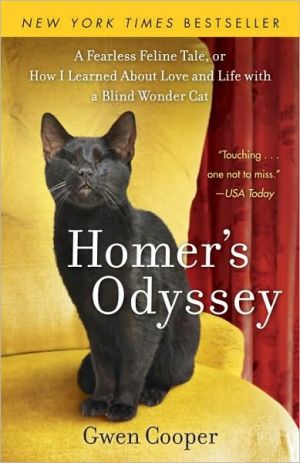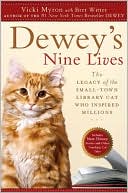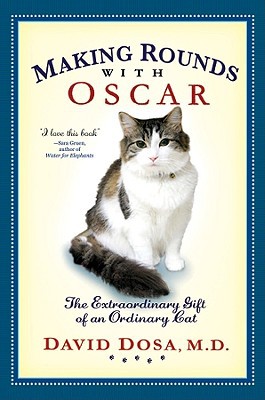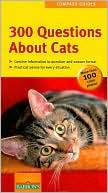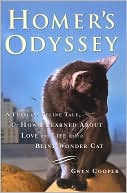Homer's Odyssey: A Fearless Feline Tale, or How I Learned about Love and Life with a Blind Wonder Cat
ONCE IN NINE LIVES, SOMETHING EXTRAORDINARY HAPPENS. The last thing Gwen Cooper wanted was another cat. She already had two, not to mention a phenomenally underpaying job and a recently broken heart. Then Gwen’s veterinarian called with a story about a three-week-old eyeless kitten who’d been abandoned. It was love at first sight. Everyone warned that Homer would always be an “underachiever.” But the kitten nobody believed in quickly grew into a three-pound dynamo with a giant heart who...
Search in google:
Once in nine lives,something extraordinary happens...The last thing Gwen Cooper wanted was another cat. She already had two, not to mention a phenomenally underpaying job and a recently broken heart. Then Gwen's veterinarian called with a story about a three-week-old eyeless kitten who'd been abandoned. It was love at first sight.Everyone warned that Homer would always be an "underachiever," never as playful or independent as other cats. But the kitten nobody believed in quickly grew into a three-pound dynamo, a tiny daredevil with a giant heart who eagerly made friends with every human who crossed his path. Homer scaled seven-foot bookcases with ease and leapt five feet into the air to catch flies in mid-buzz. He survived being trapped alone for days after 9/11 in an apartment near the World Trade Center, and even saved Gwen's life when he chased off an intruder who broke into their home in the middle of the night.... Publishers Weekly Cooper had every intention of saying “no” to the veterinarian who asked her if she was interested in adopting a four-week-old stray kitten with a “particular handicap.” She was fresh off a bad breakup, working a low-paying job and living rent-free in a friend's bedroom—plus she was worried about the social implications of adding one cat to the two she had already adopted: “The neighborhood kids will... say things like 'That's where Old Widow Cooper, the cat lady, lives.' ” But as soon as she picked up the tiny kitten and he started to purr, she caved. She settled on a name and brought Homer home. His intrepid explorations of his new environs quickly challenged Cooper's expectations of a blind cat. And through 12 years, six moves, several boyfriends and a showdown with a burglar, this tender and affecting book reveals Homer's lessons about love and acceptance—and how he transformed Cooper into the woman she had always wanted to be. Photos. (Aug. 25)
Chapter One\ • Socket to Me\ Yesterday made the twentieth day that I have been tossing about upon the sea. The winds and waves have taken me all the way from the Ogyian island, and now fate has flung me upon this coast.\ —Homer, The Odyssey\ Years ago, back when i still had only two cats, i was fond of saying that if I ever adopted a third I would name him Meow Tse-tung and call him "The Chairman" for short.\ "Don't look at me like that, it'll be cute," I would insist when my friends regarded me as if I were a loon. "Little Chairman Meow."\ The joke was twofold: the name itself, and also the idea that I would adopt a third cat. I might never have taken the monumental step (so it had seemed to me at twenty-four) of adopting two except that I'd been living for three years with Jorge, the man I was sure I'd marry. We'd split up recently, and I had gained custody of our feline offspring—a sweet-tempered, fluffy white beauty named Vashti and a regal, moody gray tabby named Scarlett. I was grateful for my two girls every day, but also painfully aware of the potential complications they would create in my newly single life, complications I had never contemplated back in the days when I'd thought Jorge and I would be together forever.\ I was staying in a friend's spare bedroom while I tried to save up for an affordable place to live, for example, but I would never be able to move into a more reasonably priced pet-free building. There was no point in even considering a relationship with a man who had cat allergies. I worked in nonprofit, running _volunteer programs for the United Way of Miami-Dade, and I never had more than fifty dollars in the bank at the end of the month. Nevertheless, routine vaccinations, injuries, and illnesses would have to be paid for by me alone, no matter what their impact on my finances.\ "Not to mention the social implications," my best friend, Andrea, would say. "I mean, there are only so many cats you can have when you're twenty-four and single. The neighborhood kids will start calling you Old Widow Cooper and throw rocks at your windows and say things like, That's where Old Widow Cooper, the cat lady, lives. She's craaaaazy . . ."\ I knew she was right; I wasn't completely out of touch with reality. In my present circumstances, talking about a third cat was an absurd hypothetical, like daydreaming about what I might buy if I won the lottery.\ Then one afternoon, a couple of months after Jorge and I broke up, I got a call from Patty, a young veterinarian only three years older than I was, who was the newest member at the practice that treated Scarlett and Vashti. Patty told me a long, sad story that would have been perfect for a cable movie, if only there were a station called Lifetime for Cats.\ An orphaned, four-week-old stray kitten had been abandoned at her office, she said, after a virulent eye infection had required the surgical removal of both his eyes. The couple who had originally brought him in didn't want him. Nor did any of the people on her adoption list, not even the ones who had expressed a specific interest in adopting a handicapped cat. Nobody, it seemed, wanted to face this particular handicap. I was her last call, the last possibility she could think of, before . . .\ She didn't finish her sentence, and she didn't have to. I knew there was almost no chance that an eyeless kitten would be adopted from a shelter before his time ran out.\ Don't, warned the Greek chorus that lives inside my head. Yes, it's sad but, honestly, you're in no position to do anything about it.\ I'd always been an obsessive reader, a passionate lover of books, and I knew the kind of power words had over me. Pitting me against words like blind, abandoned, unwanted, and orphan was like sending someone armed with a toy rifle into trench warfare.\ Still, I recognized the wisdom of my inner Greek chorus, even if I couldn't be as coolly analytical as it was. So I said, "I'll come in and meet him." I paused. "I'm not promising anything, though."\ I should note that, prior to this, I had never taken an I'll meet him and we'll see attitude when it came to pet adoption. It never occurred to me to meet the pet in question first, to see if he was "special" or whether there was some sort of unique bond between us. My philosophy when it came to pets was much like that of having children: You got what you got, and you loved them unconditionally regardless of whatever their personalities or flaws turned out to be. While I was growing up, my family adopted or fostered numerous dogs, almost all of whom were strays or had been abused in their previous homes. We'd had dogs who couldn't be housebroken, dogs who chewed up carpeting and wallpaper, dogs who dug compulsively under fences or who even occasionally snapped when they were startled. My cats, Scarlett and Vashti, had been adopted a year apart from acquaintances who'd found them as six-week-old kittens—mange-ridden, half starved, and covered in fleas and sores—wandering the streets of Miami. I had committed to them sight unseen; the first time I'd met them had been the day they'd come to live with me.\ So I felt more than a little dishonest, driving down to my vet's office the following afternoon. Patty might not know it, but I knew myself well enough to understand that when I'd said, "I'll come in and meet him," what I'd meant was, I really don't want a third cat right now, but I'd feel like a bad person if I gave you a straightforward no after hearing this cat's story. So I'm leaving myself room to wriggle off the hook.\ "We have to take him. We have to let him live here" had been the immediate response of my roommate, Melissa, when I'd told her about the blind kitten the night before—"here" being Melissa's one-story, two-bedroom, waterfront South Beach home, where I split the cost of utilities, groceries, and other household expenses while I tried to save up for my own place. But Melissa was beautiful, and an heiress, and the everyday obstacles that appeared insurmountable to me at this juncture in my life weren't even blips on her radar screen. Melissa didn't have to agonize over things like higher vet bills, or being unable to eventually find a home for herself and her brood of three (three!), or the prospect of being undateable. (I could already hear imaginary conversations among these mythical men I hadn't even met yet—let alone started dating. Dude, she's smart, she's cute, she's a lot of fun—but she's got three cats! That's just messed up, dude.)\ I couldn't decide if I was even the right person for a kitten like this, a kitten who would undoubtedly have special needs I couldn't begin to anticipate. What if he never learned to get around on his own? What if my other two cats hated him on sight and made his life miserable? What if I simply wasn't up to the challenge of taking care of him? I could barely take care of myself. Arguably, given that I was living in somebody else's home at the moment, I couldn't take care of myself.\ I'd been encouraged, briefly, by Melissa's use of the word we. I wouldn't be in this alone. In some small, crafty corner of my brain, it occurred to me that I could bring the kitten home and, if I proved unequipped to handle him, Melissa could always . . .\ "Of course, you're the one who has to make the final decision," Melissa had added a moment later, "because he'll go with you when you move out."\ The thing that was speeding me toward my vet's office as surely as the wheels and motor of the car I was driving, the thing that had gotten me to agree to meet this kitten in the first place, was guilt. If I didn't take him, no one would. I had always been an easy mark when it came to animals and everybody knew it. I was a veteran weekend volunteer at Miami's various animal shelters, and—back when Jorge and I were still living together—I'd always come home in tears, pleading with him against all reason to consider adopting one of the dogs or cats who stood to be euthanized if nobody stepped forward. My only run-in with the law thus far had been the time, in college, when I'd been arrested at a protest rally outside of my university's primate research center. I'd been the kid who stray dogs and cats followed to school because I would give them all the food out of my lunchbox, without considering how I planned to feed myself at lunchtime.\ And it was exactly this kind of hazy, immature thinking, I told myself somewhat viciously as I slid into the parking lot outside my vet's office, this heedless disregard for future consequences, that had landed me exactly where I currently was in life—broke and alone after years of carefully constructing what I'd thought was an unshakable future.\ I realize now that I was trying to manufacture a sense of anger. It was far easier to convince myself I was angry and put-upon than it was to admit I was terrified.\ It was a ferociously muggy, late-August day. Silvery waves of heat shimmered and rose like evil genies from the pavement fronting the strip mall where my vet had her office. The receptionist greeted me warmly as I entered, summoning Patty, who popped her head out from a door behind the reception desk with a cheerful "Come on back!"\ I followed her past rows of cages holding cats and dogs, which I'd noticed before but never paid much attention to. I'd always assumed they'd been left in the temporary care of my vet by owners who would eventually come to retrieve them. For the first time, I wondered how many of them were actually homeless, waiting to be looked over by people like me who might or might not end up adopting them.\ We reached the last examination room at the end of a narrow, wood-paneled corridor, and Patty opened the door for me. On the exam table was a lidless plastic box ("So you can interact with him," she explained). I walked over and peered in.\ He's so tiny was my first thought. Both of my cats had been almost this young when I'd taken them in, but I'd forgotten how absolutely tiny a four-week-old kitten is. He couldn't have weighed more than a few ounces. He had curled himself up into a miniature sphere in the farthest corner of the box, a fuzzy softball that would have fit easily into the palm of my hand. His fur was all black, and it had that static-electricity fluffiness that very small kittens have, as if their fur has actively rebelled against the notion of lying flat. Where his eyes had been were two tiny stitches, and around his neck was one of those plastic cones they put on pets to keep them from scratching stitches out.\ "I sutured the lids shut," Patty said. "So it won't look like he has sockets or anything—it'll kind of look like he has his eyes closed all the time." She was right. Looking at the X-shaped stitches where his eyes would have been, I was reminded of childhood cartoons where the drunkenness or demise of a character was indicated by X's drawn over his eyes.\ "Hey there," I said softly. I scrunched down a bit, so my voice would come from the kitten's level and not sound too booming or scary. "Hey, little guy."\ The black fuzzball in the corner of the box uncurled itself and stood up hesitantly. I tentatively reached a hand—a hand that suddenly seemed monstrous in size—into the box and lightly scratched the bottom of it. The kitten walked slowly toward the sound, his head bobbing uncertainly under the weight of the plastic cone. His nose bumped against one of my fingers, and he sniffed it curiously.\ I glanced up at Patty, who said, "You can pick him up if you want to."\ I lifted him carefully, cradling him just below my chest with one hand supporting his bottom and the other around his chest and front legs. "Hi, little boy," I whispered.\ At the sound of my voice, he turned himself around and reached up to my left shoulder with his front paws; they were so small, they sank between the cables of the light cotton sweater I was wearing. He struggled a bit, and I could tell he was trying to hoist his full weight onto my shoulder. But his claws, such as they were, were too tiny to get a good grip. Giving up, he twisted again and brought his face as close to where my jaw met my neck as the plastic cone would allow. He tried to rub his face against mine, although all I felt was plastic against my cheek. Then he started to purr. The cone funneled the sound until it was so loud, he sounded like an improbably small motor.\ I had expected that, having no eyes, he would be incapable of conveying much expression—and it occurred to me that this, perhaps, was the secret fear of the people who'd refused to adopt him. A pet whose face couldn't register love, couldn't reflect emotion, might always feel like a stranger in your home.\ As I held him, though, I realized that it isn't the eyes that tell you how someone is feeling or what they're thinking. It's the muscles around the eyes, which pull the corners up or push them down, crinkle them at the edges to convey amusement or narrow them into slits indicating anger.\ This kitten didn't have his eyes anymore, but the muscles around them had been left intact. And I could tell, from the shape the muscles were taking, that if he'd had eyelids they would have been half closed in an expression eminently familiar to me from my other two cats. It was an expression of utter contentment. The ease with which he slipped into it suggested that, despite everything he'd already been through—despite every reason he'd had to expect the opposite—in the depths of his kitten-y little soul, he'd always known there would be a place where he could feel completely warm and secure.\ And now, at last, he'd found it.\ "Oh, for God's sake." I put him gently back into his box, then rooted around in my purse for a tissue.\ "Wrap him up, I'm taking him home."\ ***\ Patty was insistent that the kitten remain with her a little while longer. She wanted to keep an eye on his stitches, concerned about possible infections. And she also hoped he might gain some weight before being subjected to the tender mercies of solid food and two full-grown cats. "You can take him home in a few days," she promised.\ I was finally getting my Chairman Meow, but somehow a prefab name didn't seem right anymore. "You should call him Socket," Melissa suggested.\ "That's awful!" I exclaimed. "His name is not Socket!"\ She shrugged good-naturedly. "He'll always be Socket to me."
\ From Barnes & NobleLike the ancient Greek bard, Gwen Cooper's feline Homer is blind, but there their similarity ends. There is no evidence, for example, that the author of The Iliad ever liked to be tickled on the belly or any indication that he could rival cat Homer's capacity to form bonds instantly with strangers. In this Homer's Odyssey, the hero is a fearless three-pound, four-footed housemate who teaches wisdom just by being himself. The equal of nine ordinary lives.\ \ \ \ \ Publishers WeeklyCooper had every intention of saying “no” to the veterinarian who asked her if she was interested in adopting a four-week-old stray kitten with a “particular handicap.” She was fresh off a bad breakup, working a low-paying job and living rent-free in a friend's bedroom—plus she was worried about the social implications of adding one cat to the two she had already adopted: “The neighborhood kids will... say things like 'That's where Old Widow Cooper, the cat lady, lives.' ” But as soon as she picked up the tiny kitten and he started to purr, she caved. She settled on a name and brought Homer home. His intrepid explorations of his new environs quickly challenged Cooper's expectations of a blind cat. And through 12 years, six moves, several boyfriends and a showdown with a burglar, this tender and affecting book reveals Homer's lessons about love and acceptance—and how he transformed Cooper into the woman she had always wanted to be. Photos. (Aug. 25)\ \ \ Library JournalWhen Cooper agreed to adopt a third cat that was eyeless from a terrible infection because no one else would, words like blind, abandoned, unwanted, and orphan were in her mind before she met this kitten. Instead of feeling pity, she fell in love with the tiny feline, and the epic odyssey of Homer began. Homer grew into a daredevil cat that made friends with everyone he met (including dog people) and never once let his lack of sight impede his joy for life and love for Cooper. Homer's antics such as the ability to catch a fly in midair are delightful, but what is most touching is how his courageous spirit teaches Cooper and readers that there are no limits on love or ability. VERDICT With Homer as a messenger for those special-needs cats waiting to be adopted, this lovely human-feline memoir, following in the footsteps of Vicki Myron's best-selling Dewey: The Small-Town Library Cat Who Touched the World, is sure to warm the hearts of all pet lovers. [See Prepub Alert, LJ 5/1/09.]—Eva Lautemann, Georgia Perimeter Coll. Lib., Clarkston\ \
